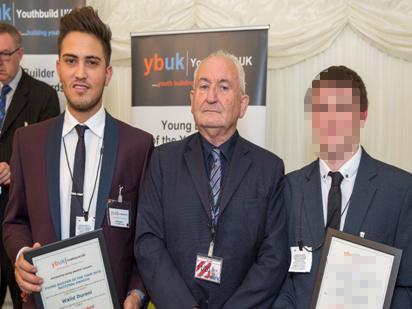Teenager invited to Parliament for Young Builder of the Year Awards nomination to be deported to Afghanistan
Exclusive: Walid Durani fled home country after his grandfather was beheaded by the Taliban, who threatened him with the same fate

Your support helps us to tell the story
From reproductive rights to climate change to Big Tech, The Independent is on the ground when the story is developing. Whether it's investigating the financials of Elon Musk's pro-Trump PAC or producing our latest documentary, 'The A Word', which shines a light on the American women fighting for reproductive rights, we know how important it is to parse out the facts from the messaging.
At such a critical moment in US history, we need reporters on the ground. Your donation allows us to keep sending journalists to speak to both sides of the story.
The Independent is trusted by Americans across the entire political spectrum. And unlike many other quality news outlets, we choose not to lock Americans out of our reporting and analysis with paywalls. We believe quality journalism should be available to everyone, paid for by those who can afford it.
Your support makes all the difference.It was September 2012 when the Taliban beheaded Walid Durani’s grandfather. The corpse was dumped in a ditch in the Ghazni province of Afghanistan with a note pinned to the severed head: either the Durani family stopped supplying the American military with oil and electricity, or the next eldest male would face a similar fate.
Walid’s father had been kidnapped by a different group of insurgents six months previously, so that person was Walid. He was 14 years old.
The threat caused his mother to bundle him into a car that same day, which took him across the border to Pakistan. From there, relatives put him aboard a plane that brought him to Heathrow. His escape was so precipitate and disorienting that Walid admits he had no idea where he was when he arrived.
“I couldn’t speak any English back then,” he says. “All I had was my brother-in-law’s telephone number.”
Walid applied for asylum seeker status. He was rejected but, as a minor, was allowed to stay in the UK. He began school, learned English and befriended the son of a local building and development company, who took Walid on as an apprentice. He also studied bricklaying one day a week at college, at which he excelled.
The dedication and determination he showed in his new vocation led him to be nominated in the 2016 Young Builder of the Year Awards. Walid received a commendation and was among 16 youngsters who were invited to the Houses of Parliament in order to receive a certificate from Lord Bird, the founder of The Big Issue magazine.
However, Walid’s luck changed when he turned 18; as an adult, he no longer has the right to remain in the country. The immigration judge in his original trial had declared the 14-year-old an economic migrant, and the Home Office has repeatedly denied his applications as an asylum seeker on the grounds that he must prove his claims of persecution with paperwork.
Walid, who lives in Fleet, Hampshire, has tried to obtain proof of his grandfather’s death, but has hit a brick wall.
“The police are so corrupt in Afghanistan that I can't get any documents without paying a substantial bribe,” he said.
“Besides, death certificates don’t really exist there. The country is too chaotic.”
Having exhausted his legal recourses, and with his final appeal having been rejected late last year, he now faces deportation at any moment, leaving the Afghan teen tearful and desperate.
“I have no one left in Afghanistan,” he said. “My family has all escaped to Austria, but I can’t join them because I don’t have a passport. What will I do if they fly me back to Kabul? I will have to live on the streets.”
A Home Office spokesperson told The Independent: “We do not routinely comment on individual cases.”
Join our commenting forum
Join thought-provoking conversations, follow other Independent readers and see their replies
Comments